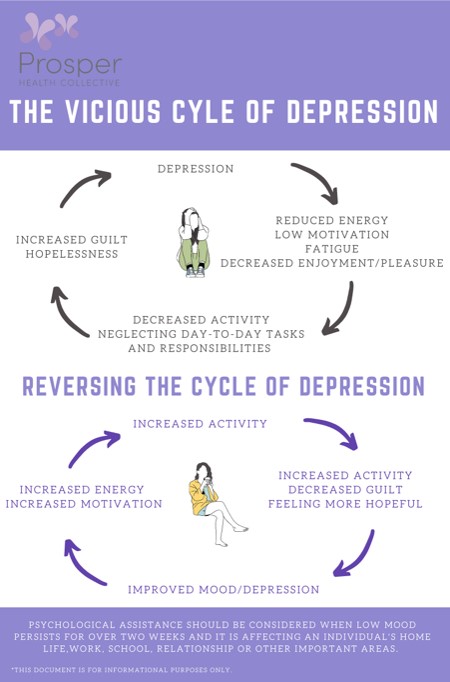Reversing the vicious cycle of depression

Depression is characterised by low mood and other symptoms (such as loss of interest in preferred activities, significant changes in appetite/weight, sleep disturbances, fatigue or loss of energy, increased feelings of hopelessness, helplessness, worthlessness, or extreme guilt). In depression, these symptoms are often intense in nature, pervasive and long-lasting, cause significant distress to the individual and can have a negative impact on an individual’s day-to-day functioning and in other important areas of an individual’s life (such as relationship, work, school).
When an individual experiences symptoms of depression, a vicious cycle may develop.
- The individual may experience symptoms such as reduced energy, fatigue, low motivation, and decreased enjoyment/pleasure in activities.
- As a result, this can lead to decreased engagement in daily activities.
- This may result in decreased activity and neglecting day-to-day tasks and responsibilities.
- As a result, the individual may lose confidence in his or her ability to complete tasks and this can also result in increased sense of guilt, hopelessness.
- This in turn, can result in the individual becoming more depressed and disengage from even more activities. Thus, this cycle continues and gets worse.
Reversing the Vicious Cycle of Depression
One way of breaking the vicious cycle is by becoming more active and increasing activity levels (particularly activities that lead to a sense of pleasure/enjoyment and achievement).
Reversing the depression cycle may begin by:
- Increasing activity or gradually starting to tackle the list of tasks or responsibilities (but doing this in a realistic and achievable way) (e.g., going for a walk, going to the movies, listening to music, or attending to a chore).
- This may result in decreased feelings of guilt, feeling more hopeful and increased confidence.
- This can lead to improved mood and improvements in symptoms of depression and increased energy, motivation, and enjoyment.

*Part of this material incorporates information from a free resource from the Centre for Clinical Interventions (CCI), which can be accessed here .
If you or a loved one is struggling from symptoms of depression it is recommended that professional support is considered. If you would like further information, please do not hesitate to contact us at the practice on 6381 0071.